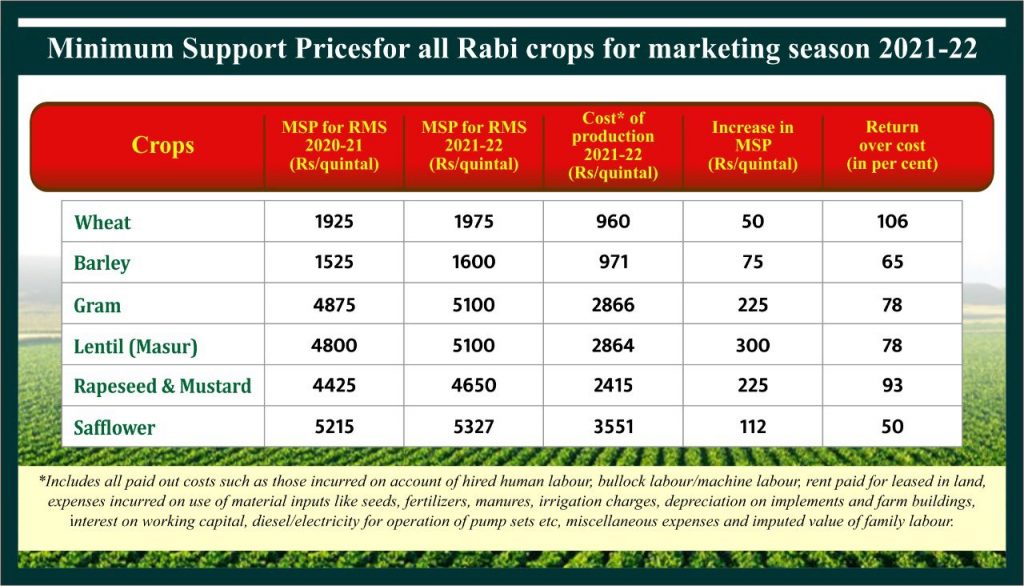
Govt hikes MSP of six Rabi crops amid row over farm bills
The government on Monday (September 21) hiked the minimum support price (MSP) of six Rabi crops for Rabi Marketing Season 2021-22 amid a row over the Centre's new farm bills, which the farmers are worried, would affect the current MSP system.

The government on Monday (September 21) hiked the minimum support price (MSP) of six Rabi crops for Rabi Marketing Season 2021-22 amid a row over the Centre’s new farm bills which the farmers are worried would affect the current MSP system.
The decision was taken at a meeting of the Cabinet Committee on Economic Affairs (CCEA) chaired by Prime Minister Narendra Modi and was announced by Union Agriculture Minister Narendra Singh Tomar in Lok Sabha on Monday.
Tomar said the CCEA has approved increasing MSP of six Rabi crops. Wheat MSP has been increased by ₹50 per quintal to ₹1,975 per quintal. Procurement of wheat has more than doubled during the last five years and reached 42.6 lakh in 2020-21, the government said.
Related news: MSP will stay, farmers to get investment: Govt on farm sector bills
Meanwhile, the MSP of barley has been hiked by ₹75 per quintal to ₹1,600 per quintal. It has been hiked at an annual growth rate by 5.7 per cent. The highest increase in MSP has been announced for lentil at ₹300 per quintal. Its MSP is now ₹5,100.
MSP of rapeseed and mustard has been hiked at annual growth rate by 7 per cent. With an increase of ₹225 per quintal, its MSP now stands at ₹4,650 per quintal. The MSP of gram is now ₹5,100 per quintal after an increase of ₹225 (at annual growth rate of 8.3 per cent).

Related news: PM allays farmers’ fears, says mandis, MSP will continue
The MSP of safflower has been increased by ₹112 per quintal to ₹5327. For safflower, the return to farmers over cost of production is estimated at 50%.
The MSP mechanism provides a price guarantee to the farmers for their produce and the uniform implementation of this policy across India ensures equity, the agriculture ministry tweeted. The MSP has been announced on the basis of the Swaminathan recommendation of providing 50 per cent return over cost of production, it said.
The government has set up a buffer stock of pulses and domestic procurement of pulses is also being done under Price Stabilisation Fund (PSF), said the ministry.
The announcement comes in the backdrop of widespread protests by Opposition parties as also by farmers in Punjab and Haryana after the Parliament passed two farm bills which the government says will give farmers’ marketing freedom and better price for their produce.
Related news: Farmers protest against Centre’s new farm bills in Haryana
The Farmers’ Produce Trade and Commerce (Promotion and Facilitation) Bill, 2020 and The Farmers (Empowerment and Protection) Agreement of Price Assurance and Farm Services Bill, 2020 were passed by Parliament by voice vote amid strong protests by the Opposition.
The minister said the government has always maintained that MSP and APMC mechanisms will continue as against a false propaganda spread by Opposition parties. Some Congress MPs walked out of the House after Tomar made the announcement about MSPs.

